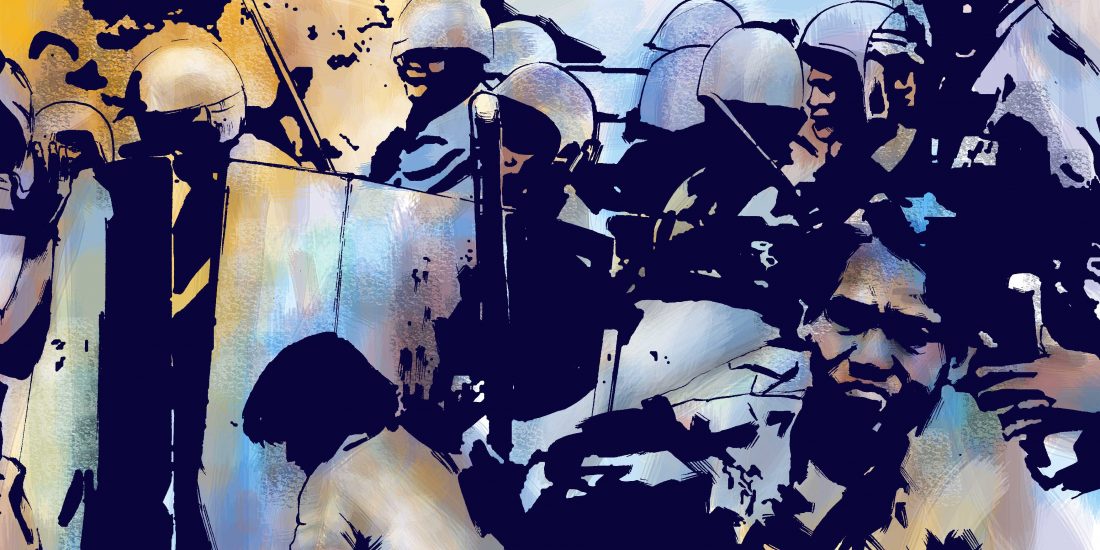Never Again, Never Forget: A review of NAVoML Set C

Commemorating the dark ages of Martial Law, Ladies Who Launch together with Commission on Human Rights and Bantayog ng mga Bayani Foundation exhibits Never Again: Voices of Martial Law—a set of plays reliving the buried nostalgia using theatre as the medium in educating and reminding everyone—especially the younger generation—about the atrocities during Marcos’ regime that reigned for almost 44 years. A profound product of the knowledge and past truly revisited the era of horrors and recalled its resounding repercussions in modern society. The three plays included in Set C are: Shhh, Ang Lihim na Kasaysayan ng Huling Habilin ni Ferdinand Edralin Marcos (Spiritual King Solomon of Israel) Hinggil sa Pamanang Kayamanan ni King Bernardo Carpio at Jose Protacio Rizal Para sa Pagpapaunlad ng Bansang Pilipinas na Siyang Nalalaman ni Mang Ambo, Taxi Driver, and Indigo Child.
Shhh
Silence is suffocating. Just imagine the people deprived of speaking out about their own welfare and the truth—this is how Allan Lopez, with excellent direction from Jenny Jamora, reimagined the past in his script. This refined story revolves around the steamy couple Kim (Thea Yrastorza), a photojournalist, and Mark (Karl Medina), a law student, conversing about their revolutionary agendas, activist friends, scholarly opinions about the regime, and even Imee Marcos’ physique. As the story evolves, they find themselves caught up in the story of Archie Trajano who disappeared after he questioned Imee Marcos about the alleged nepotism in her father’s governance.
The eroticism between the two characters brings balance to their complex conversation, all while being sensually and wittily portrayed by Yrastorza and Medina. Although the storyline includes a few names that can be slightly confusing, the play still exhibits the main point about the importance of opinions and on how being ignorant isn’t an excuse to defy our own curiosity. The latter part of the story introduces a new character, someone who has a big impact on the storyline. Amid the entrance of this mysterious character, the intensity subdues the room’s atmosphere from the sensual ambiance of the two main characters. In retrospect, the play reveals something that the Martial Law has registered from the Filipinos—our threatening curiosity.
Ang Lihim na Kasaysayan ng Huling Habilin ni Ferdinand Edralin Marcos (Spiritual King Solomon of Israel) Hinggil sa Pamanang Kayamanan ni King Bernardo Carpio at Jose Protacio Rizal Para sa Pagpapaunlad ng Bansang Pilipinas na Siyang Nalalaman ni Mang Ambo, Taxi Driver
A depiction of the typical Pinoy way of commuting, the play comically portrays the relationship between knowledgeable people and those who are gullible enough to believe in political hoaxes. Written by Guelan Varela-Luarca, with amazing direction from Roobak Valle, an unexpected discourse between taxi driver Mang Ambo (Lou Veloso) and his passenger G (J-mee Katanyag) provides hilarious and cringing facts about the history of Marcos’ wealth, making the audience burst out laughing while banging their heads. The powerful and comical lines thrown by the characters are very suitable for every age, even presenting it in a relatable way.
Guelan’s excellent story flows from the fictional knowledge of Mang Ambo about Marcos’ inherited wealth from King Bernardo. Exceptionally witty, this is a representation of the modern toxicity revolving among the younger generation and gullibility taking over the Filipino people. Katanyag’s natural acting skills bring the entire auditorium euphoria; same goes to Veloso who characterizes Mang Ambo’s sensible attitude effortlessly. Although the play highlights sarcasm, one of the main tags of the show is to disclose the story behind why people are gullible enough to stick with unrealistic tall tales. A balance between the perspectives of the two characters enables the audience to understand people without mocking their ability to think factually. With the rightly measured substance of wit and sarcasm, Guelan’s brilliant work aims to understand the perspectives and opinions of those who are far from the realm of political and historical factuality.
Indigo Child
The emotional bruises brought by a tormented past continuously haunts the present—this encompasses the impressive story of a mother and child in Indigo Child. With the brilliant direction of Jose Estrella and the striking lines by Rody Vera, the play was brought to theaters and revealed the eye-opening truth about the grievous circumstances of a mother during the Martial Law regime. The character of Felisa (Skyzk Labastilla) depicts a brave personality despite the trauma from her haunting experiences, making her endure all the pain and suffering she had gone through. Being an empowered woman of her age, Skyzk portrays Felisa’s revolutionary personality in times where the fire within is constantly being killed.
The story’s progressive state emphasizes Rafael Tibayan’s role as Jerome, the son of Felisa who shows exceptional versatility in stage. In Tibayan’s depiction of vulnerability and strength, he diverts from different emotions and stages as his character develops. A play composed of intensity and selfless love, it captures the positivity of revisiting our pasts to seek for freedom, yet causing wreckage to our inner beings as we discover the things we don’t want to know. With the disturbing and interesting storyline and incredible cast, Indigo Child transports us in the era of nostalgia, and how we can fight the battles from the past.
***
Staged at the Alfonso T. Yuchengco auditorium, Never Again: Voices of Martial Law runs until the 16th of October with other sets: Set A (Loyalist Redux, Duyan Ka ng Magiting, and Thingy or Ang Pak na Pak Ganern na Ganern sa Pakikipagsapalaran ni Melenyo, D’ Great Pokemon Hunter) and Set B (Disco 1081, Princess Lilli, and Bulong-Bulungan sa Sangandaan) to remind Filipinos about the viciousness of the past, and its aftermath that we’re still suffering from 44 years later. In an attempt to tell stories and heal wounds, the production revolves not to romanticize the sufferings of Martial Law victims, but to educate the people to not repeat our mistakes. We are the Filipino people—and we must never forget.




